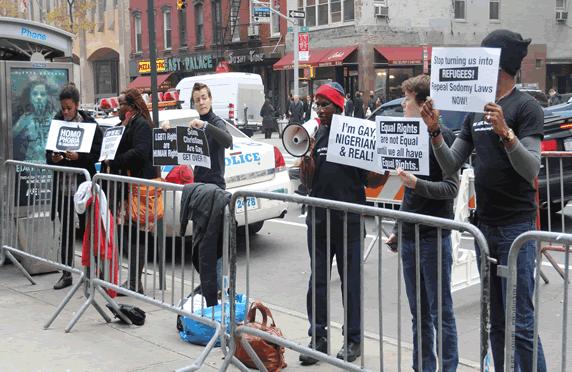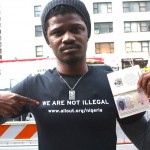By Kristen Thompson, student at Columbia University
“We are holy, angry people, and we are singing for our lives”

What do you do when your government is trying to criminalize your identity? For Nigerian LGBT rights activist Ifeanyi Orazulike, the answer is: fight back. On Monday I joined Ifeanyi and other activists outside the Permanent Mission of Nigeria to the United Nations to protest the anti-gay “Same-Gender Marriage Bill” passed by the Nigerian Senate, which currently awaits the approval or veto of President Goodluck Jonathan.
But this bill is not really about marriage. It broadly defines “same-sex marriage” as including all same-sex relationships, and charges people who “witness,” “aid” or “abet” such relationships with imprisonment for up to five years. It’s a modern day witch-hunt, which puts LGBT rights activists and HIV/AIDS service providers for the LGBT population, like Ifeanyi, in particular peril. This is insult on top of severe injury – today Nigerian same-sex relationships are punished with up to 14 years in prison in some regions, and with lashing and death by stoning in others.
Ifeanyi heads the International Centre on Advocacy for the Right to Health (ICARH), which provides HIV/AIDS prevention, treatment, outreach and education services to men who have sex with men (MSM) in Nigeria. Even in the midst of this political maelstrom he told me he is eager to go back home because there is much work to do, even though he knows his life is in danger.
Today he and fellow activists solemnly sang in front of the mission and passersby: “We are holy, angry people / We are singing, singing for our lives.”
Pride and Prejudice

I met Ifeanyi when he spoke at a SIPA event I organized with the Human Rights Working Group, GLIPA, and others on November 22nd called Pride and Prejudice: Perspectives on Homophobia and LGBTQI Rights in Sub-Saharan Africa.
Betsy Apple, Adjunct SIPA Faculty Member started the discussion with a few sobering statistics:
- Roughly one-third of all countries in the world criminalize homosexual conduct or identity.
- Five countries prescribe the death penalty to same-sex sexual conduct.
She said, “Criminalization criminalizes identity; when you are an illegal person, it’s very difficult for you to do everything, from love who you choose, have access to health and education, have freedom of speech and movement and expression, be able to participate in the public life of your country, be able to protect yourself from violence and discrimination.”
The film trailer of Call Me Kuchu (trailer below) clearly illustrates this struggle unfolding for LGBT rights in Africa. It highlights Ugandan activist David Kato, who was recently brutally murdered after a Ugandan newspaper printed the names, addresses and photos of LGBT activists alongside the headline “Hang Them.”
[vimeo]http://vimeo.com/27391482[/vimeo]
Homophobia and the Spread of HIV/AIDS
For Ifeanyi, the words and images of Call Me Kuchu strike close to home. He held back tears as he discussed the struggles ICARH faces in combating HIV/AIDS in Nigeria – MSM face stigma and discrimination which cause them to avoid seeking care altogether. This is especially problematic in a country where the HIV prevalence rate among MSM is 13.5%, three times higher than the national rate.
Dr. Cheikh Traore, Senior Policy Advisor for Sexual Diversity and HIV/AIDS at the United Nations Development Programme underscored the problem of homophobia in combating HIV/AIDS, sharing the results of a 2009 study on MSM in Malawi, Namibia, and Botswana which showed MSM are more vulnerable to HIV due to human rights violations against them. They are blackmailed by health workers after disclosing their sexual orientation and face physical violence, including by government or police officials. All this adds up to MSM being further discouraged from seeking health care services.
From Hand-Wringing to Action
Jessica Stern, Director of Programs at the International Gay and Lesbian Human Rights Commission rounded out the panel. As the first researcher on LGBT rights at Human Rights Watch she conducted fact-finding missions in South Africa, where she reported on the brutal murder of a 19-year old lesbian who was beaten and killed by a mob in the township of Khayelitsha near Cape Town.
Jessica noted that this happened in South Africa, a country which outlaws discrimination based on sexual orientation and is also the first African country to legalize same-sex marriage. In South Africa, transgender men and lesbians are often still targeted for violence and discrimination.
So, what can we do when law and policy only go so far in protecting LGBT rights? Jessica offered some suggestions:
- Educate the public about their rights. If people don’t know their rights – to HIV treatment, social services, and privacy, for example – it’s very difficult to access them. They must also be aware of their government’s anti-LGBT policies so that they can best protect themselves.
- Train authorities. In many countries, police target transgender women for discrimination. They may also refuse to take reports on crimes against LGBT people. It’s critical to look at how laws are being implemented on the ground and have a proactive strategy for using them to affirm peoples’ rights.
- Build stronger movements. Lived experience is essential to any strategy, and activists working on the frontlines know what needs to be done. Jessica left us to ponder, “How can we interrogate our different places to contribute in solidarity with local struggles?”
Feel free to leave a comment below. How can we interrogate our different places in society (school, internship, job, social network, etc.) to contribute in solidarity to local LGBT struggles? What are your thoughts on the topic?
Kristen is a Master of International Affairs Candidate ‘13 at Columbia University, concentrating in Human Rights. She is the incoming President of GLIPA (SIPA’s LGBTQ group).

Thanks Kristen for such an interesting post! This is an issue that is close to my heart – but I can’t help feeling that the human rights movement on the whole is still seriously failing Ifeanyi and others. When will gay rights be adequately addressed as human rights at the UN level? Tuesday was a step. Please keep me in the loop with any organizing you are doing on campus and I’ll be there!
– Tanya
Thanks, Tanya! From what I’ve seen there are some steps being taken at the UN, most notably the UN Human Rights Council resolution on human rights violations based on sexual orientation and gender identity this passed in June this year. (Link to HRW statement here: http://www.hrw.org/news/2011/06/17/historic-decision-united-nations).
There was an LGBT panel related to International Human Rights Day today (Dec 8) at the UN in which Ivan Šimonović, Assistant Secretary-General for Human Rights, mentioned the HRC resolution but said a next step would be to have a UN General Assembly resolution with the same content. He also said that the standards for human rights are there (presumably he was talking about in the Human Rights Declaration), but that there just needs to be recognition that they apply to LGBT people. He said the role of the UN was in bringing more governments to a commitment to protect LGBT rights, but also recognized there’s a big leap from that to implementation.
He mentioned the UN is working both through discreet diplomacy and public advocacy against homophobic laws and that last year the UN Secretary General reminded the African Union leaders about the importance of LGBT rights. He emphasized this issue is high on the list for the Secretary General in his discussions with world leaders. Dr. Traore also mentioned the UN’s priorities on LGBT rights & HIV/AIDS at the panel, it just didn’t make it into the blog.
For information on how to get involved, there are a couple of orgs that would be good to sign up with for action alerts/updates on these issues:
Allout.org (the group that organized the protest and is very net/grassroots action-oriented: http://www.allout.org
and
IGLHRC (Jessica’s group): http://salsa.democracyinaction.org/o/1870/signUp.jsp?key=4195
My hope is our November event will be just the first in a series exploring LGBT rights around the world. I’ll keep you posted and anyone can sign up for the GLIPA listserve by email me at [email protected].
Cheers,
Kristen
Actually, I think the person who made those comments was actually Kenneth Roth, ED of Human Rights Watch.